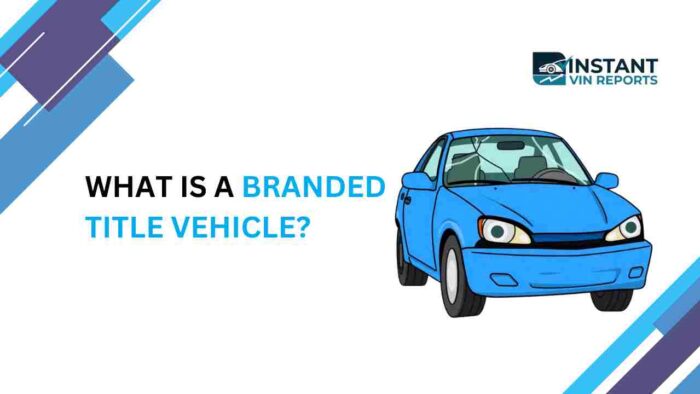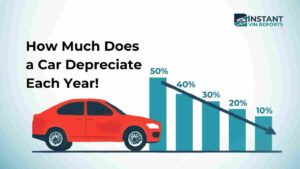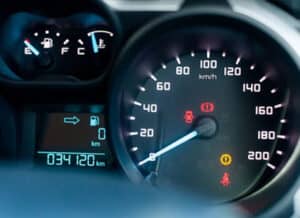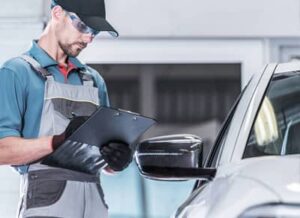When buying a used car or other vehicle, inspecting its condition is a must to avoid unforeseen repairs. A professional mechanic can help you do just that.
However, not all car problems are immediately apparent from their physical condition alone. Sometimes, the previous owner hides everything so well that even a professional mechanic cannot spot the flaws.
That’s where a vehicle title comes into play. When a vehicle gets involved in trouble or is damaged due to accidents or natural disasters, it gets stamped with a branded title that will be attached to its vehicle identification number (VIN).
These titles are typically assigned after the vehicle has been in an accident damaged by flood, hail, fire, or vandalism. Not only that, if a vehicle has an outstanding lien record, it will also get a title.
What is a Branded Title Vehicle?
If you’re shopping for a used car, you may have seen the term “branded title.” But what exactly does it mean? A branded title vehicle is a car, truck, or SUV that has sustained significant damage or issues, causing its title to reflect this history. A state’s DMV assigns these titles to alert potential buyers about the vehicle’s past.
Branded titles are essential because they can affect a vehicle’s safety, value, and insurability. Let’s dive into what branded titles entail and how they might influence your decision to buy a car.
Types of Branded Titles
Not all branded titles are the same. They vary depending on the type and severity of the damage. Here are the most common types:
Salvage Title
A salvage title is issued when an insurance company declares a total loss on a car. This means the repair costs exceed a certain percentage of the car’s market value, usually due to an accident. Salvage cars cannot legally be driven until they’re repaired and inspected.
Flood Title
Vehicles with flood titles have suffered water damage, often from hurricanes or flash floods. Water can ruin a car’s electronics and mechanical systems, making buying risky. Over time, flood-damaged cars may also develop mold or rust.
Rebuilt Title
A rebuilt title is assigned to a car once a salvage vehicle but has since been repaired and deemed roadworthy after inspection. While these cars can be a bargain, their prior damage may still affect long-term reliability.
Lemon Title
Lemon titles are given to vehicles with chronic defects or recurring issues, typically covered under state lemon laws. The manufacturer often repurchases these cars because they could not be repaired to meet quality standards.
Why a Vehicle Might Receive a Branded Title
A branded title is an official record that documents significant events that have changed a vehicle’s life, which can impact its reputation and history. These branded titles are intended to protect customers from fraudulent car dealers by providing them with transparency about the vehicle’s past.
Here’s a closer look at common reasons why a car has a branded title:
Accident
Serious collisions that require major repairs often result in salvage or rebuilt titles. A salvage title typically indicates that repairing the car would be more expensive than its pre-accident value. If a salvaged car is repaired and passes a strict inspection, it can be issued a rebuilt title. This title still shows it had serious damage.
Natural Disaster
Events like floods, earthquakes, and other natural disasters that physically damage the vehicle and cannot be repaired may result in the vehicle being branded with a title.
Flood Damage
Cars that have been submerged underwater due to flooding can have significant problems with their mechanical, electrical, and structural components. If the car has ever been flooded, it can be labelled as “Flooded”. Even if they are fixed, it could still lead to long-term issues such as rust and mold.
Fire Damage
A car that caught on fire may get fire damage. Fire damage is particularly hazardous because it can compromise the structure, melt wires, and cause extensive damage that may be beyond repair.
Hail Damage
Very bad hail damage can make many dents and damage the car’s body. Sometimes, insurance companies will declare it a “total loss.”
Mechanical Failures
If a car has a problem from the factory that persists over time and cannot be fixed, it can be referred to as a “Lemon”. The car’s manufacturer might buy it back, then resell the car with a “lemon buyback” title.
Theft Record
If a car has ever been stolen and then recovered, it may receive a “theft recovery title.” The car might not be damaged, but the title showed that it had been stolen.
Pros of Buying a Branded Title Vehicle
Buying a branded title vehicle can be a mixed bag. Here are some points to consider:
Lower Price
Cars with certain titles will have a lower price in the used car market compared to those in good condition. Branded title cars typically cost 20–50% less than similar cars with clean titles.
Availability
You can sometimes find cars that are usually too expensive in the used car market with a branded title. This includes rare or high-end models that were damaged and then fixed. This lets people who don’t have a lot of money own cars they usually couldn’t afford.
Points to Consider Before Buying a Branded Titled Vehicle
Buying a titled car involves several key considerations before making a purchase. Here are the things you need to consider:
Hidden Issues
Even if the car is already fixed, there may still be damage that is not visible to the naked eye. Problems with the structure from the accident, lingering electrical faults from the flood, or long-term effects of the fire can lead to expensive repairs later. It’s essential to get a thorough check from an independent mechanic.
Limited Warranty
Most, if not all, factory warranties are no longer valid on cars with a branded title. Additionally, obtaining extra warranties from other companies can be more expensive or challenging due to the associated risks.
Harder to Resell
Reselling a branded car is more challenging compared to a standard used car. Many buyers are worried about branded titles, so you will likely have to sell it for a lower price than a similar clean-title car. Getting finance and insurance can also be more difficult for branded title cars.
How a Branded Title Affects Insurance, Financing, and Resale Value
Branded title vehicles can complicate things when it comes to insurance, financing, and resale:
- Insurance: Insurers may charge higher premiums or refuse to provide full coverage for these cars.
- Financing: Some lenders are reluctant to offer loans for branded title vehicles. If financing is available, the terms may not be favorable.
- Resale Value: Branded title cars typically have a lower resale value and appeal to fewer buyers.
The Importance of Checking a Vehicle’s History Before Purchase
A thorough investigation is necessary when buying a car with a branded title. A vehicle history report provides key details like past accidents, repair records, and ownership history. Skipping this step could leave you with unexpected problems down the road.
For example, some branded title vehicles are repaired poorly or not inspected properly. A detailed history report can help you verify the repairs and ensure the car’s safety.
Related: Importance Of Accurate Car Reports To Used Car Buyers
Avoid Surprises with Instant VIN Reports’ Comprehensive Insights
Instant VIN Reports offers tools to help you navigate the complexities of branded title vehicles. You can uncover the story behind any used car with services like VIN decoding and vehicle history reports. This includes details about accidents, title changes, and even manufacturer recalls.
Their platform also provides access to window stickers, which can reveal the car’s original features and specifications. This is especially useful when assessing whether a branded title car meets your needs.
Related: The future of car-reporting technology and how it benefits consumers
Conclusion
A branded title vehicle can be a cost-effective option for the right buyer but it comes with risks. Understanding the different types of branded titles and their implications is key to making an informed choice. Always verify the car’s history with a detailed report and consider the challenges of insuring and reselling it.
Before you bag the vehicle, use tools like Instant VIN Reports to decode the VIN and get a comprehensive vehicle history. With the proper knowledge and information, you can decide whether to buy a branded vehicle.











